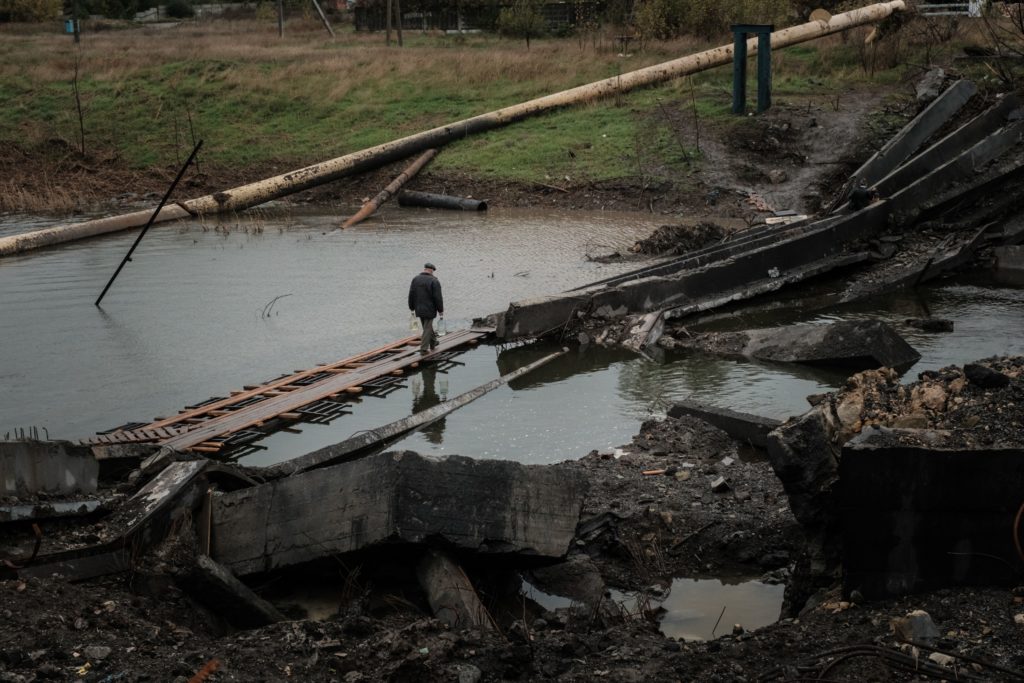Alexander Temerko is a U.K. businessman and councillor at the Institute of Economic Affairs. He is a former junior defense minister of the Russian Federation.
Against the backdrop of Russia’s indiscriminate terrorist attacks on cities throughout Ukraine — a show of President Vladimir Putin’s impotent rage at the Kerch Bridge’s frailty and his army’s ability to stop its destruction — United States President Joe Biden has warned that the risk of nuclear “Armageddon” is higher now than at any point since the Cuban Missile Crisis in 1962. Putin’s frustrated threats have finally gone from saber-rattling to genuine potential for mass destruction.
It is said, if God wants to punish a man, he takes their sanity; but if God wants to punish a nation, he takes the sanity of its leader — as they try, in their madness, to remake the whole world for themselves — or threaten to destroy it.
The history of mankind has known plenty of such examples. Every unstable dictator has his own Rubicon, and in passing beyond it, disaster is inevitable both for the leader and their country.
Putin’s fake referendums in the occupied oblasts of Kherson, Zaporizhzhia, Donetsk and Luhansk are precisely the Rubicon beyond which he cannot return — and which make real nuclear warfare appear genuinely conceivable for the first time. By annexing these territories, Russia has ceased to exist as a universally recognized sovereign country within previously known borders. And its leader, too, has ceased to exist as the legitimate representative of that country.
The world does not recognize a Russian Federation that includes the annexed territories, from Luhansk to Kherson, and it doesn’t recognize such a leader either. What Putin has done, by “incorporating” this territory is to deprive himself of the remnants of legitimacy. Therefore, negotiations, meetings and other discussions with Russia’s leader are in and of themselves no longer legitimate.
Yet, the crimes Putin has committed have made him not only illegitimate but also an international criminal — and communication with an international criminal is possible only via an international court.
The whole world recognizes these referendums for the abject farces they are. But these stunningly brazen annexations aren’t simply the last gasp of a stalled and increasingly weak invasion force. Putin’s referendums are so divorced from reality, and set such a destructive legal precedent, that the only option for the international community is to now remove Russia’s seat at the U.N. Security Council.
Russia’s war is no longer a local war; it’s no longer just about Ukraine, or even Europe. It’s now a war aimed at upending an international world order that’s been built since the defeat of the previous aggressive, fascist regime in Europe 75 years ago.
That regime, too, tried to redraft the world order and the way in which international relations were conducted — and by force. They scorned the League of Nations and destroyed any pretense that the international community as it was organized could — in between arguments, disputes and disagreements — regulate itself.
If Russia’s allowed to keep hold of Kherson, Zaporizhzhia, Donetsk and Luhansk through force of arms — even if the West doesn’t “recognize” the results — the consequence will be the destruction of the international order’s legitimacy.
And similar questions of legitimacy will also arise if Russia is allowed to retain its seat at the U.N.
Russia’s war is no longer a local war; it’s no longer just about Ukraine, or even Europe | Yasuyoshi Chiba/AFP via Getty Images
Despite Kyiv’s impressive battlefield victories and momentum in the war, the danger for Ukraine, the West and the world at large is far from over. Rather, this is the crucial moment to ensure Ukraine becomes the prime example of the Western world order’s strength and longevity, governed by international laws and diplomacy — not brute force and propaganda.
And for this to occur, two simultaneous outcomes must happen: First, Russian invaders must be expelled from all of Ukraine — there simply cannot be negotiated peace involving a loss of territory in exchange for cease-fire.
Second, Russia must lose its standing in the rules-governed international world order and become a pariah, like North Korea. A Russia that retains its place on the U.N. Security Council — after so mercilessly threatening the security and stability of the U.N. itself — would make a mockery of the international principles on which the body is built.
Putin is threatening those who disagree with him with the use of nuclear weapons, condemning millions just to save himself. And in so doing, he forces the issue — Western leaders now have no way to avoid a decision on Putin and Russia’s fate. Otherwise, tomorrow, any sovereign part of any nation could, according to Russian authorities, “hold a referendum” and be announced part of Putin’s Russia, its people losing their right to exist.
Ensuring Russia’s illegal referendums spell its downfall isn’t a technicality, it’s at the core of the war in Ukraine.
In international diplomacy, military action backed by political propaganda can never be accepted as a way of shifting borders or destroying countries. Since the U.N.’s formation in the wake of World War II, the number of members that have been eliminated is zero. But this principle, which holds to this day, won’t withstand a U.N. member invading, and progressively annexing, its neighbor’s territory, while hiding behind the shield of a Security Council veto.
Putin’s legitimacy as a leader, and Russia’s legitimacy as a country on the world stage, has been forever ruined by this criminal war. What remains to be seen, however, is if the West will do what must be done to preserve the world order — not just by sanctioning Russia and divesting from its energy, but by stopping its participation at the international level until it’s a reformed country.
It must do so for the sake of the entire world.



